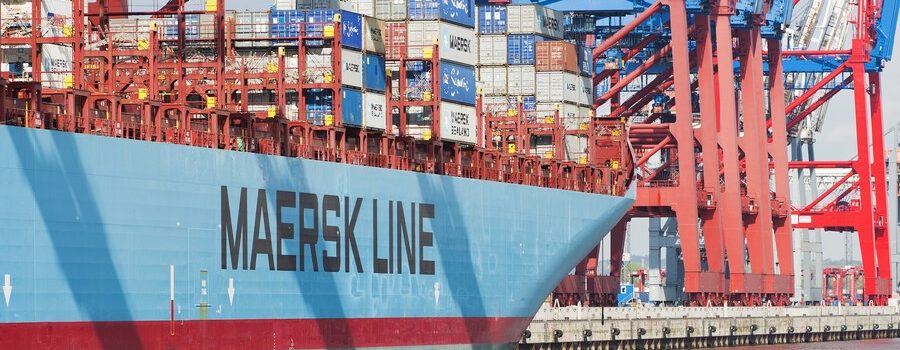After TradeLens: Where Does the Global Shipping Industry Go from Here?

By Isabelle Dupraz
This post originally appeared on LinkedIn by the Coalition for Reimagined Mobility.
Maersk, the global trade giant, and IBM announced last Tuesday that they will pull the plug on TradeLens, an effort to digitize the supply chain through a blockchain-enabled global trade platform they launched in 2018 to bring trade information sharing into the 21st century.
TradeLens was ahead of the curve. In championing the use of blockchain technology in an industry that still relies on paper-based documentation and other analog forms of communication like fax machines, TradeLens sought to leapfrog intermediate steps along the path to supply chain digitalization.
Freight sector industry leaders widely considered TradeLens to have been a disruptive force across supply chains, making important strides in advancing the digitalization of global trade.
While TradeLens moved the needle, these intermediate steps remain critical to the industry’s resilience.
For sophisticated technologies like blockchain to achieve its full potential for the future of global trade, we need a level playing field for all stakeholders to share information across the freight value chain. The alternative is like a group of friends trying to talk to each other, but only one of them has a telephone.
Data standards help create that level playing field. Creating industry-wide data exchange standards is an essential step in the freight sector’s digital revolution, allowing stakeholders to share information seamlessly, creating a more resilient and secure supply chain, and improving the efficiency of cargo movements.
Digitalization of global trade comes with tremendous benefits
The Coalition for Reimagined Mobility (ReMo) found, in collaboration with the International Transport Forum, that data exchange standards can reduce emissions by 22 percent, and costs by 6%, by 2050 through efficiencies from vehicle routing, and higher utilization of assets and infrastructure. That translates into the freight industry using 2.5 billion fewer barrels of oil a year. With geopolitical tensions on the rise and oil-rich countries weaponizing the fuel source, reducing oil dependence is vital, not only for economic stability and environmental sustainability but also for national security.
But that can only happen with standardized data exchange.
To catalyze this revolution, policymakers must invest in the development and dissemination of data exchange standards, that are technology-neutral, openly accessible, and governed by a trusted third party.
Public-private collaboration is crucial. Convening stakeholders across multi-modal freight, such as through the Maritime Transportation Data Initiative led by the U.S. Federal Maritime Commission, provide key opportunities to ensure true collaboration and buy-in to unlocking the benefits of data exchange standards.
Overcoming challenges to global coordination
TradeLens primarily provided visibility and allowed smoother electronic documentation sharing across the freight ecosystem, from ocean liners to freight forwarders, and ports, and others. It garnered support and entered into agreements with various carriers including MSC, ONE, Hapag-Lloyd and CMA-CGM, as well as 20 ports, including PSA Singapore and the Port of Rotterdam. Since its launch, the platform has tracked over 3.7 billion unique events, published 36 million documents and processed over 70 million containers.
Though Maersk and IBM developed a viable platform, Rotem Hershko, Maersk’s head of business platforms acknowledged that “the need for full global industry collaboration has not been achieved.”
Indeed, global visibility platforms require full industry buy-in to reap the benefits of information sharing without making information silos worse.
The highly competitive and outdated mindset of ocean freight stakeholders results in carriers hesitating over information sharing and a lack of trust across the sector.
This reluctance is worsened by the perception that the benefits of data sharing might be imbalanced or result in a winner-takes-all outcome. With Maersk at the helm of the project, customers and prospects were concerned over Maersk’s access to their data.
Critics of the platform have also raised concerns regarding the suitability of blockchain technology to freight logistics and prioritizing the use of blockchain over core functionality. Distributed ledger technology, commonly known as blockchain, is used in some of the platform’s electronic documentation functionality. Despite its benefits of increasing trust, security, transparency and traceability, several barriers are yet to be overcome. Because the underlying infrastructure is hard to change by tech adopters, interoperability remains a key challenge.
Digitalization is key to unlocking emissions and industry savings and driving resilience across supply chains. Global freight is still a long way out from being fully digital. Many processes remain paper-based and/or require phone calls or even faxes. There is no magic switch. Digitalization is a long and complex process, and globally, stakeholders will always find themselves at different stages in the process.
TradeLens’ announcement is unfortunate, but this initiative has moved global trade in the right direction. The competitive landscape is ripe with other innovators and disruptors eager to use existing technology to solve these problems, and policymakers should seize the opportunity to enable innovation by creating a standardized foundation for it.
We can’t afford not to.
Isabelle Dupraz is a Policy Associate with the Coalition for Reimagined Mobility.
